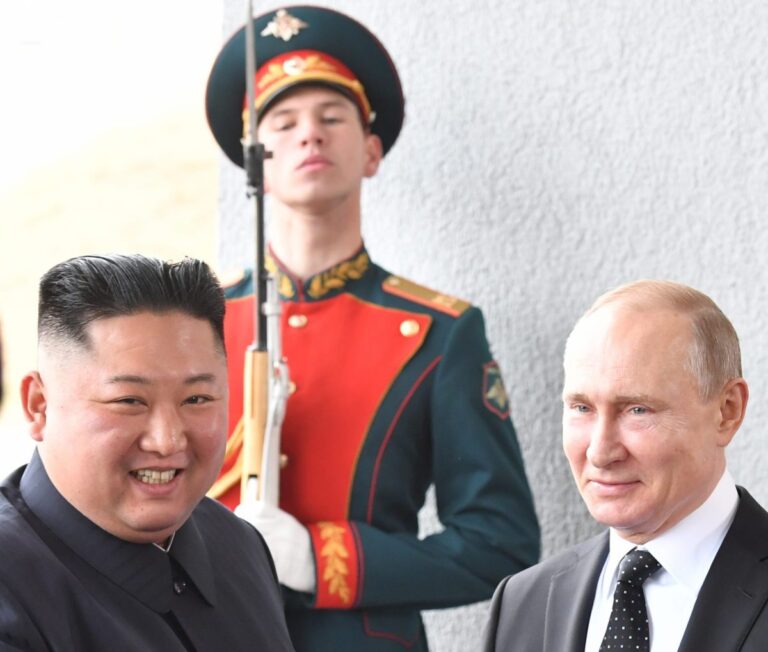
[ad_1]
He is a despicable dictator of one of the world’s poorest countries, yet he commands our attention because he resembles a glamorous villain from James Bond, traveling to meet President Vladimir Putin in Russia in a photogenic armored train.
To North Korea’s leader, Kim Jong Un, that visit represented a triumph. For Putin, it was an opportunity but also a humiliation. For Asia and the world, however, it was just a cinematic sideshow. Much more important events were happening elsewhere.
Let us give President Kim his little triumph. North Korea is always desperate for money, and in the past has earned foreign exchange by counterfeiting money, cybertheft, exporting slave labor, producing illicit drugs, and myriad other means.
It channels much of what it earns into its nuclear weapons and ballistic missiles program. So a Russian neighbor desperate to buy North Korean munitions, and even prepared to provide some technological assistance in return, will have seemed to Kim like a salesman’s dream customer.
This will not, however, make any noticeable difference to Russia’s war in Ukraine, useful though extra supplies will be, especially of basic ammunition. North Korean weapons production is too small and its equipment too backward to be a game-changer. What this meeting shows is how badly strained Russia’s own weapons production and supplies must be if Putin needs to cuddle up to the likes of Kim Jong Un.
For a political leader whose every action in recent years has been designed to prove that Russia remains a superpower to be feared and admired, this can only represent a humiliation. The Kim-Putin embrace does remind us that Russia does have options in its search for military supplies, but they are poor and bleak ones, such as North Korea and Iran.
The most important fact surrounding this Kim-Putin-Blofeld encounter, however, is that it did not include China or its leader Xi Jinping, and that China continues to avoid becoming a supplier of weapons or other military materials to Russia. Sino-Russian trade has boomed since Putin’s invasion of Ukraine in February last year, thanks to severe Western sanctions on Russia, but there is no evidence that this trade has included anything military.
This is significant. Just three weeks before Putin’s 2022 invasion, the Chinese and Russian leaders met in Beijing and signed a lengthy “Joint Statement” declaring that they had a strategic partnership “without limits”, under which they shared their opposition to the West and their determination to bring to an end Western domination (as they saw it) of the rules and institutions of global governance.
The fact that this Joint Statement, which opposed the use of force and interference in the internal affairs of other states, was swiftly followed by Russia’s violent intervention in Ukraine indicated that both China and Russia claim a right to intervene in countries which they believe should belong to them, for historical reasons: Ukraine for Russia, Taiwan for China.
In that sense, for China Ukraine represents a proxy war. Yet so far, China has stood well back from direct involvement. Its partnership with Russia does, for the time being, have a limit: it does not include military support or supplies.
In the 1950s or 1960s, it would have been reasonable to think of North Korea as a proxy for China, making Kim’s visit to Russia potentially a route through which Chinese military support for Putin might be challenged.
But for decades now North Korea and China have not been, as Chairman Mao called it, “as close as lips and teeth.” In fact, their relationship has become distant and occasionally hostile. In any case, if North Korea were acting as a conduit for Chinese weapons supplies to Russia, American intelligence would have spotted it by now.
Instead, the more important events were happening in New Delhi, as India hosted the big annual “G20” summit that connects together the world’s biggest countries, rich and poor, and in Hanoi, as President Joe Biden flew on from Delhi to meet Asia’s second-biggest communist-run country, Vietnam.
China’s Xi Jinping chose not to attend the G20, perhaps because he had just been engaged with other forms of international summitry more to his liking, or perhaps because the Chinese economy is in a state of crisis. Reports leaked from high-level Chinese political discussions to Japanese reporters have suggested that President Xi has recently come under unusually open and severe criticism from the party’s elders about the state of the economy.
Russia is desperate, China is under strain, but meanwhile, its rival India flourished at the G20 and American diplomacy is making advances in China’s own backyard. President Biden’s visit to Vietnam, against which it was at war until 1975, was part of a series of efforts to build partnerships and alliances designed to counter China’s influence.
This was also a salesman’s dream, but this time a dream for both Vietnam and the United States, for both made attractive deals. We are just more accustomed to Air Force One than to Kim’s armored train.
Formerly editor-in-chief of The Economist, Bill Emmott is currently chairman of the Japan Society of the UK, the International Institute for Strategic Studies and the International Trade Institute.
This article was originally published on Bill Emmott’s Global View Substack and was published in Italian in La Stampa. Asia Times is republishing the article with permission.
Related
[ad_2]
Source link